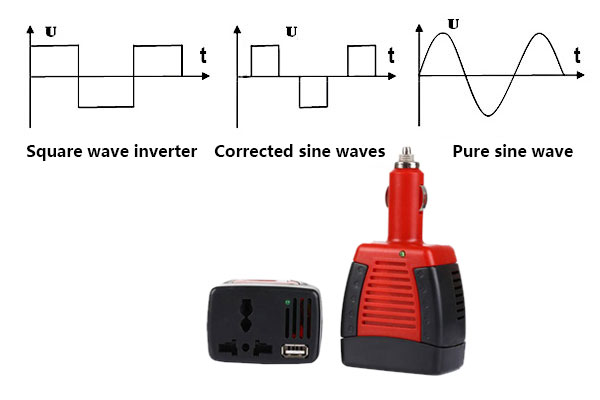A car inverter also called a car power inverter or DC to AC inverter, is an electronic device that converts direct current (DC) electricity from a vehicle's battery or power port into alternating current (AC) electricity, similar to what you get from a household electrical outlet. There are many things to consider when choosing a car inverter.
Key precautions for selecting a car inverter
When choosing a car inverter, it's essential to consider several precautions to ensure safety, compatibility, and optimal performance. Here are some key precautions to keep in mind:

Power selection
Looking at various power inverters, how should we choose a car battery inverter? First of all, we need to know which electrical equipment is needed in the car, and then select the inverter specification according to its power. Also, consider the fusing current of the car's cigarette lighter fuse.
If the power of the electrical appliance to be used exceeds 180W, the high-power inverter can be directly connected to the battery through the battery connection cable. But this method can only be used in an emergency, not for a long time, otherwise, it will cause damage to the battery itself. The output power of the on-board inverter must be greater than the electrical power used, to ensure that it can fully start.
Output Interface
After selecting the specifications of the vehicle power inverter, let's take a look at the output interface of the inverter itself. At present, many electrical appliances use plugs. This requires a 3-hole interface on the inverter. In addition, there are also many USB interfaces. Therefore, it is best to choose 3 types of interfaces to have a car power inverter.

Output waveform
In addition, according to the difference of output current waveform, the car inverter is divided into pure sine inverter and modified sine inverter. Among them, the pure sine inverter has a stable power supply, and ordinary electrical appliances can be driven well. However, the modified sine wave is closer to the square wave, and the quality of the output current is poor, which will cause certain damage to some electrical equipment.
Although the price difference between these two inverters is very large, if it is used for a long time, we still recommend that you choose a pure sine inverter. Because no matter what type of electrical equipment it is, you don't have to worry too much when using a pure sine inverter to power it.
Protective function
When choosing a car inverter, be sure to check whether it has over-temperature protection, over-current protection, and short-circuit protection. These functions do not only protect the car inverter for laptop itself. More importantly, it avoids damage to electrical equipment.
Match input voltage to your vehicle
Ensure the inverter matches your vehicle's DC input voltage (typically 12V or 24V). Using an inverter with the wrong voltage can damage both the inverter and your vehicle's electrical system.
Check for safety features
Ensure the inverter has essential safety features such as:
Overload protection: Automatically shuts down the inverter if it exceeds its rated capacity, preventing damage.
Short circuit protection: Protects against short circuits, which can occur if wires or connections are damaged.
Over-temperature shutdown: Turns off the inverter if it overheats, preventing damage and fire hazards.
Evaluate physical size and installation
Measure the available space in your vehicle where you plan to install the inverter. Ensure it fits comfortably and securely.
Consider ease of installation and whether you need additional cables or connectors to connect the inverter to your vehicle's battery or power port.
Understand usage limitations
Be aware of the inverter's limitations, including its maximum continuous and peak power ratings. Avoid consistently operating the inverter near its maximum capacity to prolong its lifespan and prevent overheating.
Consider intended use and environment
Determine whether you need an inverter for occasional use during road trips or daily use for work purposes. Consider environmental factors such as temperature extremes and humidity levels that may affect inverter performance.
Budget wisely
Balance your budget with the features and quality you need. Avoid compromising on essential safety features or power capacity to save money, as this could lead to operational issues or device damage.
